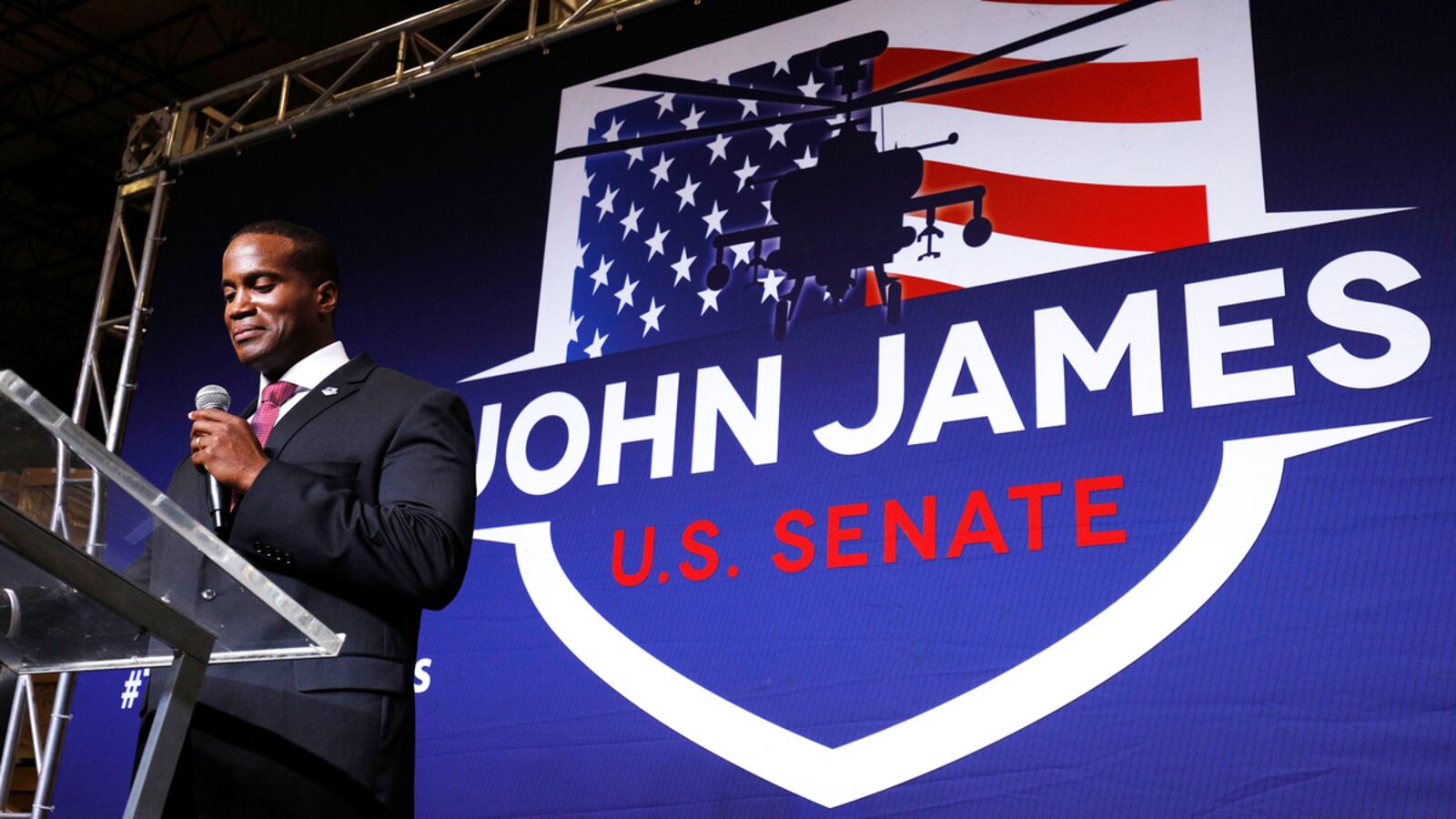During his second run at the U.S. Senate this year, Michigan businessman John James has enjoyed the support of a deep-pocketed dark-money group that appears to be effectively operating as an extension of the James campaign itself.
The group, Better Future Michigan (BFM), is ostensibly independent from James’ political team. But it’s run by James’ former campaign manager, who was drawing checks from the campaign just a few months before BFM ran its first broadcast ad attacking Sen. Gary Peters (D-MI), the Democratic incumbent that James, a Republican, is trying to unseat.
That overlap, first reported by the Center for Responsive Politics, has drawn allegations of illegal coordination. But the ties between BFM and the James campaign go even deeper than revealed in that report.
PAY DIRT’s examination of public records indicates that the same individual has purchased ads for both James’ 2018 Senate campaign and the dark-money group backing him this time around. Digital fingerprints on BFM’s website, meanwhile, show that the group is working with a Republican vendor that has received hundreds of thousands of dollars from the James campaign—beginning just weeks before BFM’s inception.
All of that overlap points to an effort to support James’ Senate bid in a key 2020 swing state with an unknowable sum of income from undisclosed donors. And because BFM is a nonprofit group, not an explicitly political outfit, Michigan voters won’t get any details about its finances or structure until well after they go to the polls to choose their U.S. senator.
“Better Future Michigan appears to be operating as the dark-money arm of the James campaign,” said Brendan Fischer, the director of federal and Federal Election Commission reforms at the Campaign Legal Center. “Yet voters don’t know which wealthy special interests are pouring unlimited secret money into James’ election effort by way of Better Future Michigan.”
And here’s the kicker: Any coordination between the James campaign and BFM would be perfectly legal. “FEC rules governing coordination are narrowly focused and rarely enforced,” Fischer explained. “So despite this cozy relationship, Better Future Michigan appears to have carefully structured its activities to avoid crossing obvious legal lines.”
The campaign, for its part, says no such coordination has taken place. “Our understanding is that Better Future Michigan is a policy education organization that has effectively pointed out Gary Peters’ support for the expensive and job-killing Medicare for All,” James spokesperson Abby Walls said in a statement. “This group is providing a public service, but operates independently of the John James for Senate campaign. To the extent there are any common vendors, we trust they have appropriate firewalls in place to ensure legal compliance.”
Better Future Michigan was incorporated on June 12, 2019. That was just over a month after the group’s executive director, Victoria Sachs, who managed James’ 2018 Senate run, drew her last “management consulting” payment from the campaign. Incorporation records list the group’s sole officer as an East Lansing-registered agent and its address as the agent’s offices. But its website identifies Sachs as its executive director, and its advertiser information on file with Facebook lists its address as a Lansing-area home owned by Sachs.
Outgoing campaign staffers are generally barred from joining supportive independent political groups for 120 days. Sachs’ speedy spin through the revolving door drew allegations of illegal coordination from Michigan Democrats.
BFM’s website says it’s “dedicated to educating and engaging the public on the need for leadership committed to taking action to secure a better future through strong national security, and increased economic and educational opportunities with the objective of ensuring everyone the opportunity to achieve the American dream.”
In fact, the group exists solely to lob attack ads at Peters. And it began doing so shortly after Sachs left the campaign for its dark-money adjunct. BFM began running Facebook ads in August, and broadcast television spots in December. The group doesn’t report its expenditures to the Federal Communications Commission, making it more difficult to nail down just how much it’s spent attacking Peters or supporting James. But FCC records indicate its total broadcast ad spending is in the range of $300,000.
The group’s FCC filings also reveal another notable connection with the James campaign. The firm that BFM has used to place its broadcast ads is an Alexandria, Virginia, media buyer called Del Cielo Media. The company is actually a subsidiary of the Smart Media Group, the firm that the James campaign used to place its ads last cycle.
In fact, the very same individual handling BFM ads for Del Cielo also placed James campaign ads for Smart Media. It’s not clear from those FCC filings who exactly that individual is—but he or she left a clear enough trail. While it’s common for media buyer representatives to print their names in those filings, not all of them do, instead opting to simply affix their signatures. That’s what this media buyer did, and his or her signature is entirely illegible.
But it is clear from those filings that the same person signed forms for both committees. Here’s the signature on the James campaign’s 2018 media-buy paperwork:

And here’s the equivalent FCC filing for BFM’s ad buys late last year:

The latter screenshot is from a BFM ad buy made by Del Cielo. The phone number is the same one listed on Smart Media Group’s website.
The use of a mutual vendor is an increasingly common method to circumvent restrictions on campaign coordination. Other ad buyers have also housed multiple corporate entities under the same umbrella, obscuring such vendor overlap in their work for multiple entities that are officially prohibited from sharing information or coordinating their advertising strategies.
What the James campaign appears to have done here is a bit different. Rather than running a parallel ad campaign to its dark-money adjunct, James’ political team appears to have relied entirely on the television advertising run by a group led by James’ one-time campaign chief. The James campaign itself hasn’t run any broadcast TV ads so far this cycle. But in that void, Sachs’ group has conveniently picked up the slack.
That strategy has some significant advantages. Chief among them is the dark-money group’s near-total financial opacity. The group will never be required to publicly disclose the donors that have financed its ads. And even more general information about its structure and finances—how much money it’s raised and spent, which vendors it’s used, who staffs the group—won’t be public until it submits its first annual report with the IRS, which could come as late as 2022.
But the use of a dark-money group also comes with a few tactical drawbacks. In order to fully understand each, it’s important to spell out the distinctions between a 501(c)(4) nonprofit like BFM and an independent political group such as a super PAC.
It’s illegal for campaigns to coordinate with independent political spenders that are explicitly urging votes for their candidate or against their opponent. Some campaigns have found creative ways to circumvent that ban, including, as it happens, Peters’ own Senate campaign. It’s employed an increasingly common tactic whereby it posts video “b roll” on its website, allowing a supportive super PAC to download and use that footage in its own ads without ever actually “coordinating” with the campaign.
The coordination rules apply to all independent political spenders whether they are super PACs, which are generally set up for more explicit politicking, or dark-money groups, which can engage in outright political spending—what’s known as “express advocacy” for or against a candidate—but very often limit their advocacy to issue-based communications.
That’s one drawback of relying on a dark-money group to bolster one’s election prospects: Unlike super PACs, which are free to spend unlimited sums on outright political advocacy, nonprofits cannot have politics as their “primary purpose,” which has been interpreted to mean that they can’t spend more than 49 percent of their budget on explicit political advocacy.
But that drawback also has a distinct tactical benefit. As long as a dark-money group’s advertisements are “issue ads,” and don’t urge viewers to vote a certain way in a federal election, the group is free to coordinate that messaging with the political campaign it’s supporting.
BFM has opted for just such an issue-ad strategy. Its ads hammer Peters over his supposed support for controversial left-wing policy positions, and encourages viewers to call his Senate office in protest. The approach is clearly designed to affect voters’ views of a candidate for office, but they don’t explicitly call for throwing Peters out of office. The tactic is known as sham-issue advertising.
BFM’s precise ads underscore another benefit of the arrangement for the James campaign. The outsourcing of television ads to a third-party group is frequently used to disassociate a candidate from a supporter’s negative advertising. The candidate can publicly claim ignorance of an independent political spender slinging mud at his or her opponent. And if that spender is doing so through sham-issue ads, the more stringent rules on campaign coordination don’t apply.
In BFM’s case, that’s meant insulating James from an ad campaign that was so controversial that a number of Michigan TV stations initially pulled it from the airwaves. They did so after receiving received demand letters from the Peters campaign’s attorneys with the law firm Perkins Coie, which represents scores of the nation’s most prominent Democrats, including former Democratic presidential candidate Hillary Clinton. The firm claimed that BFM’s ads falsely portrayed Peters as a supporter of Medicare for All proposals, a claim that independent fact-checkers also found to be false.
BFM subsequently submitted a revised version of the ad that made largely the same claims. Its lawyers responded to Perkins Coie in their own letter to the broadcast stations at issue, and appear to have marshalled enough evidence for the claim to satisfy the stations into airing the ads.
The letter from BFM’s lawyers was sure to take another few shots at Peters in the process, frequently referring to the Perkins Coie attorney behind the letter as “Hillary Clinton’s lawyer.”
But the overlap between BFM and the James campaign goes beyond the groups’ television ad buyers. The campaign’s largest vendor of the cycle so far is the Republican digital consultancy IMGE, to which it paid about $236,000 for “media placement” through the end of 2019.
The first of those payments came on June 5 of last year. Less than three weeks later, IMGE created BFM’s website, according to web registration data. Hours after PAY DIRT asked the James campaign about that particular case of apparent vendor overlap, BFM’s website registration data was scrubbed of fingerprints tying it to IMGE.






